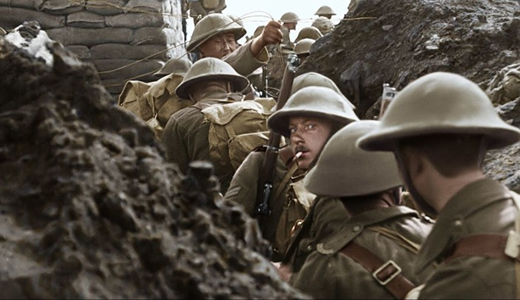What a Christmas present.
My daughter gifted me the other night with tickets to see the five-year passion project of director Peter Jackson. (The Fathom Event played Dec. 17 in about 500 theaters, and it’ll be in theaters again tomorrow, Dec. 27.) And I just had to type out a quick blog to say … Wow!
It’s called They Shall Not Grow Old, a documentary about soldiers who fought on the Western Front of World War I. Jackson and his team created it in conjunction with Britain’s Imperial War Museum from more than 100 hours of archive footage and some 600 hours of audio interviews.
Now, if your first reaction is a big “Ho-hum, I’ve seen old black-and-white war stuff before,” that’s probably a pretty typical reaction. Even though WWI was an important and horribly brutal part of history—one that lasted from July of 1914 to November of 1918—it was quickly eclipsed by the next big war that hit the spotlight just twenty years later. WWI has stayed in WWII’s more romantic, colorful and movie-lauded shadow ever since. In fact, that first massive conflict is a part of history that we average Joes and Janes don’t tend to think about or even know much about.
But Peter Jackson—of Lord of the Rings trilogy fame—is aiming to change all that. And it’s hard to truly convey all he’s done for that effort with this film.
Not only did Jackson and his gifted crew use all their technological skills to restore the old grainy, heavily damaged black-and-white archival films, but they also colorized them and stabilized the various hand-cranked film rates: The people in this movie actually move fluidly across the screen, looking and acting like real people rather than twitchy figures from an old Charlie Chaplin movie.
From there Jackson added in realistic sound effects and even hired expert lip readers to help recreate dialogue heretofore unheard in the previously silent reels. Combine all that with narrative commentary from the actual soldiers themselves—culled from interviews conducted in the 1960s with men who survived the horrendous battles on the Western Front of the war—and you end up with an amazing piece of filmmaking.
They Shall Not Grow Old tells us what these men were thinking, what they longed for, the passions they felt, how they survived, the bonds they forged and the horrors they lived through. It’s quite literally listening to voices snatched from the past: An enlightening and immersive experience that leaves you reeling. (A well-earned warning, though: This film can also leave you blanching, since the terrible wounds and gruesome corpses of war are no longer in hard-to-see black-and-white, but bloody and decaying color. We see some bare backsides in one scene, too.)
Here’s what Peter Jackson said about his project in a Time magazine interview:
What I hope this film does is make young people ask their parents or their grandparents, ‘Did we have anybody in our family in the war?’ That’s a question I think a lot of young people don’t have any interest in asking anymore. If you’ve got an old grandfather, it’s possible that his father fought and that he’s heard the stories. In 20 years, when that generation passes, anything that was handed down to them by their parents will be lost unless they are asked questions. That’s how memory can be ongoing.
Without a doubt, They Shall Not Grow Old is about memory ongoing. The film doesn’t politicize or preach, it doesn’t flinch, it simply reports, honors and memorializes. And it does it all in incredible, if sometimes difficult-to-watch ways. Click here to see if it’ll be playing near you Dec. 27.






Recent Comments